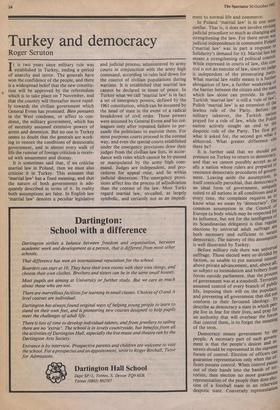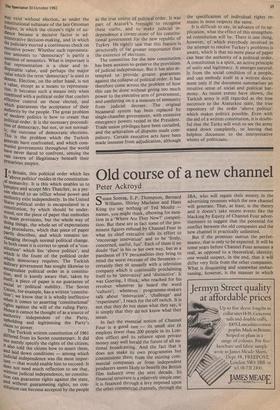Turkey and democracy
Roger Scruton
It is two years since military rule was established in Turkey, ending a period of anarchy and terror. The generals have won the confidence of the people, and there is a widespread belief that the new constitu- tion will be approved by the referendum which is to take place on 7 November, and that the country will thereafter move rapid- ly towards the civilian government which General Evren has promised. Bien pensants in the West condemn, or affect to con- demn, the military government, which has of necessity assumed extensive powers of arrest and detention. But no one in Turkey seems to doubt that the generals are work- ing to restore the conditions of democratic government, and in almost every walk of life the rumour of foreign criticism is receiv- ed with amazement and dismay.
It is sometimes said that, if we criticise martial law in Poland, then we must also criticise it in Turkey. This assumes that 'martial law' has a fixed meaning, and that the nature of both governments is ade- quately described in terms of it. In reality both assumptions are false. In English law 'martial law' denotes a peculiar legislative
and judicial process, administered by army courts in conjunction with the army high command, according to rules laid down for the control of civilian populations during wartime. It is established that martial law cannot be declared in times of peace. In Turkey what we call 'martial law' is in fact a set of emergency powers, defined by the 1961 constitution, which can be assumed by the head of state in the event of a radical breakdown of civil order. These powers were assumed by General Evren and his col- leagues only after repeated failure to per- suade the politicians to exercise them. For most purposes courts proceed in the normal way, and even the special courts established under the emergency provisions draw their judges from the civilian law lists, in accor- dance with rules which cannot be by-passed or manipulated by the army high com- mand. Judges are independent, and pro- cedures for appeal exist, and lie within judicial discretion. The emergency provi- sions affect less the process of adjudication than the content of the law. Most Turks regard martial law, so-called, as largely symbolic, and certainly not as an impedi-
ment to normal life and commerce.
In Poland 'martial law' is in one sense similar. That is, it does not involve revising judicial procedure so much as changing and strengthening the law. For there never was Judicial independence in communist Poland (`martial law' was in part a response 1° Solidarity's demand for it). Martial law has meant a strengthening of political control. While expressed in courts of law, this con- trol is not an exercise of law, since no judge is independent of the prosecuting PartY. What martial law really means is a further abrogation of law, a further weakening of the barrier between the citizen and the state which law alone can provide. In shoo!, Turkish 'martial law' is still a 'rule of law Polish 'martial law' is an extension of the lawless rule of the Party. Before the military takeover, the Turkish nation prayed for a rule of law, while the Polish nation actively sought an end to the despotic rule of the Party. The first got what it asked for, the second got what lt abhorred. What greater difference can there be? It is further said that we should Put pressure on Turkey to return to democracy, and that we cannot possibly accept as an ally a nation whose rulers are prepared 1° renounce democratic procedures of govern' ment. Leaving aside the assumption, 01 Itself comically parochial, that democracy is an ideal form of government, uniquely suited to all nations in all conditions and at every time, the complaint requires us to know what we mean by 'clemocracy'• The r common assumption in the Council °' Europe (a body which may be respected for,. its influence, but not for the intelligence c't its Scandinavian delegates) is that regular elections by universal adult suffrage are both necessary and sufficient to secure democracy. The naivety of this assumPtl°" is well illustrated by Turkey. Before military rule there was universal suffrage. Those elected were so divided hY faction, so unable to put national interest above private advancement, and, above 0, so subject to intimidation and bribery from forces outside parliament, that the process of government was at a standstill. Terrorists assumed control of every branch of public life, imposing their will on the populace! and preventing all government that did not conform to their favoured ideology. T° describe as democracy a state in which Peo- ple live in fear for their lives, and praY for an authority that will overbear the forces that control them, is to forget the meaning of the term.
Democracy means government by the people. A necessary part of such govern' ment is that the people's desires and la' terests should be represented in the supreme forum of control. Election of officers can guarantee representation only when the of ficers possess control. When control passes out of their hands into the hands of ter- rorists, then election no more guarantees representation of the people than does elec- tion of a football team in an otherwise despotic state. Conversely representation may exist without election, as under the constitutional sultanate of the late Ottoman Empire, in which the citizen's right of au- dience became a decisive factor in ad- ministrative decision-making, and in which the Judiciary exerted a continuous check on executive power. Whether such representa- tion amounts to `democracy' is partly a question of semantics. What is important is that representation is a clear and in- disputable value, and perhaps the major ,value which the term 'democracy' is used to denote. Election, on the other hand, is not a value, except as a means to representa- tion, It becomes such a means only when combined with a political order that confers effective control on those elected, and Which guarantees the acceptance of their authority by the people. The great problem Of modern politics is how to create that Political order. It is the necessary precondi- tion
, of democracy, but not, or not normal-
1Y, the outcome of democratic elections. This is the problem which the Turkish generals have confronted, and which com- munist governments throughout the world have never dared to confront, sensing the Vast cavern of illegitimacy beneath their Precarious empire.
In Britain, this political order which lies above politics' resides in the constitution- al monarchy. It is this which enables us to 'Perceive and accept Mrs Thatcher, as a per- sell elected to an office whose power and authority exist independently. In the United States political order is encapsulated in a constitution by which should be under- Stood, not the piece of paper that embodies its main provisions, but the whole way of aping things, the whole set of expectations and procedures, which that piece of paper Partly describes, and which remains un- flanging through normal political change. In both cases it is correct to speak of a `con- stitution' which lies `above politics', and which is the fount of the political order Which democracy requires. The Turkish Military government has sought likewise to encapsulate political order in a constitu- tion, and is keenly aware that, taken by Itself, a piece of paper is no guarantee of social or political stability. The Soviet Union, for example, has a written `constitu- tion,; we know that it is wholly ineffective When it comes to asserting `constitutional' nights against the will of the ruling Party. Hence it cannot be thought of as a source of authority independent of the Party, uPholding and legitimising the Party's Claim to power. The Turkish written constitution of 1961 clIffered from its Soviet counterpart. It did not merely specify the rights of the citizen; It also told the citizen how to assert them, and laid down conditions — among which Judicial independence was the most impor- tant — that would enable him to succeed. It does not need much reflection to see that, Without judicial independence, no constitu- tion can guarantee rights against the state, and without guaranteeing rights, no con- stitution can become accepted by the people
as the true source of political order. It was part of Ataturk's foresight to recognise these truths, and to make judicial in- dependence a corner-stone of his constitu- tional government for the new republic of Turkey. He rightly saw that this feature is structurally of far greater importance than the existence of elections. The committee for the new constitution has been anxious to preserve the provisions of judicial independence. But it has also at- tempted to provide greater guarantees against the collapse of political order. It has therefore come across the problem of how this can be done without giving too much power to the executive arm of government, and conferring on it a measure of immunity from judicial decrees. The original bicameral system has been replaced by single-chamber government, with extensive emergency powers vested in the President. Trade union privileges have been curtailed, and the arbitration of disputes made com- pulsory. Certain executive acts have been made immune from adjudication, although the specification of individual rights re- mains in most respects the same.
It is difficult to say, in advance of its ap- plication, what the effect of this strengthen- ed constitution will be. There is one thing, however, of which everybody involved in the attempt to resolve Turkey's problems is aware, which is that no mere piece of paper can bear the authority of a political order. A constitution is a spirit, an active principle of unity and legitimacy. It emerges natural- ly from the social condition of a people, and can embody itself in a written docu- ment only if the document summarises an intuitive sense of social and political har- mony. As recent events have shown, the Turkish army is still regarded as the true successor to the Ataturkist state, the true repository of the order `above politics' which makes politics possible. Even with the aid of a written constitution, it is doubt- ful that the Turks will wish to see the army stand down completely, so leaving that helpless document to the interpretative whims of politicians.











































 Previous page
Previous page